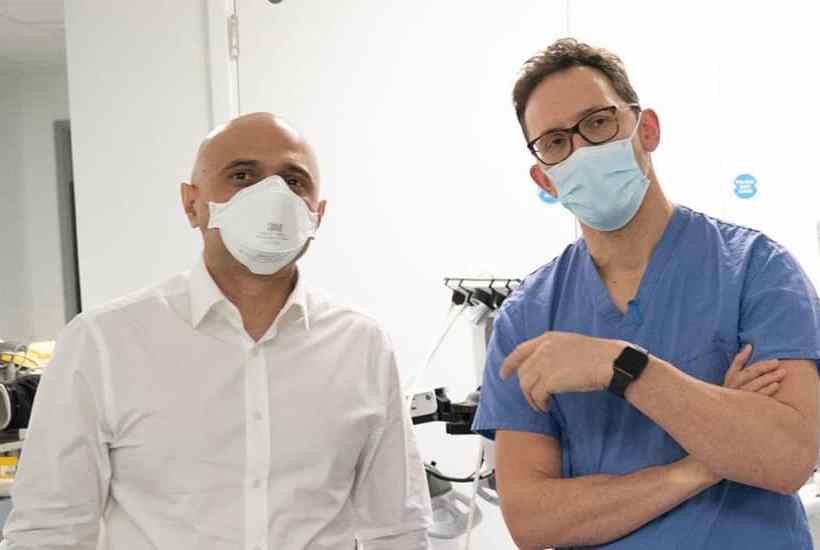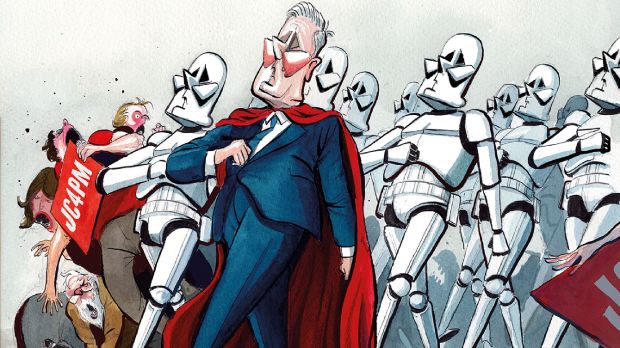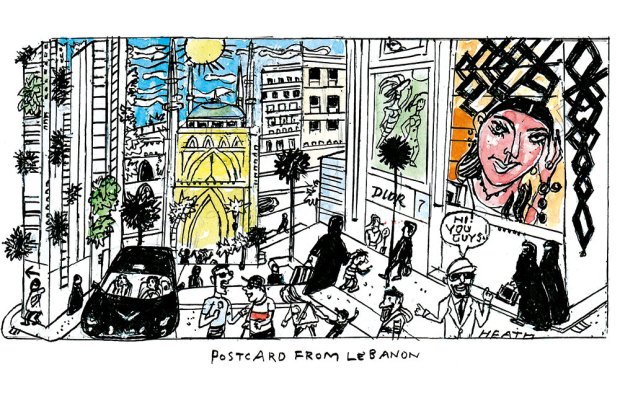A few months ago, Sajid Javid was asked how he could justify sacking unvaccinated care home workers if they had been infected with Covid and had natural immunity. The Health Secretary replied as if such people were plainly idiots. ‘If they haven’t taken a vaccine — despite all the effort that’s been made to persuade them, encourage them, provide them with information, introduce them to trusted voices — then at some point you have to move on.’ By ‘move on’ he meant thousands of them should be fired.
NHS staff are next in line: we have until 1 April to get jabbed or get out. On a recent visit to King’s College Hospital, Javid asked some of us what we thought of this. I’m an intensive care doctor and have seen all too much of Covid but I disagree with his vaccine mandate — and told him why. I’ve had the virus, I have antibodies and I am not significantly more likely to spread Covid than someone who has been vaccinated. The Omicron variant, I said, offers a chance to rethink the government’s policy.
Our exchange was caught on camera. The clip went viral and seems to have hit a nerve with the public. But why, you might wonder, would a doctor working on a Covid-19 intensive care ward not want to have the jab? Doesn’t he understand the science?
I do follow the science, and I can find no clear evidence to support compulsory vaccination. The situation is complicated. For some people, the decision to take the jab is an easy and obvious one; for others, they prefer to weigh up the risks vs the benefits.
My principal objection is to a ‘mandate’ where my colleagues and I are forced to decide between retaining bodily autonomy or retaining our jobs. Different people hold different points of view. Deriding those who disagree with you — like turning to coercion or overturning bodily autonomy — marks the point where we begin to fail as a free society.
It is notable that most of the people I treat with Covid are unvaccinated. I don’t need any lectures in how vaccines can protect a previously unexposed individual. The vaccines work and offer reasonably durable protection against contracting Covid-19 and it leading to serious illness and death. The older or more vulnerable you are, the greater the reason to take the vaccine. Some 95 per cent of over-sixties are boosted, which is probably the main reason why the numbers of patients in critical care has been falling.
But the idea that a vaccine can give you an impenetrable shield against infection is not backed up by the science. A Public Health England report in August warned that ‘there is limited difference in viral load (and Ct values) between those who are vaccinated and unvaccinated… [suggesting] limited difference in infectiousness’. What this effectively means is that jabbed and unjabbed individuals carry similar amounts of the virus, and this is now backed up by a number of studies.
In July, a Sage advisory panel warned of ‘limited vaccine effect against onward transmission for the Delta variant’. The data for Omicron is still coming in, but it already appeared that the initial reduction in transmission with a vaccine wanes over a fairly brief period of time. For the Oxford/AstraZeneca vaccine, the reduction in transmission is zero at five months. This is why I put it to Javid that healthcare workers would need to be vaccinated every month or so if the policy of reducing transmission is going to be effective. That is simply not going to happen.
Next, we need to weigh up whether or not someone has already contracted Covid-19 and developed an appropriate immune response. After vaccination, antibody levels are high (which is probably what leads to the reduction in transmission), but they drop off fast. With natural immunity, antibody levels are initially lower but they decrease more slowly. Scores of studies have shown that, broadly speaking, natural immunity is equivalent to the immunity provided by the vaccination programme. Most of these studies were carried out before Omicron, which we know to be more likely to cause breakthrough infection in vaccinated people and onward transmission generally.
Being unvaccinated is a huge risk for some, but low-risk for others. As I have seen in intensive care wards, a serious case of Covid-19 is life-threatening, but nearly all unvaccinated patients presenting to critical care also have risk factors such as obesity or other comorbidities. Not having the vaccine has weighed very heavily against these people. Even with our growing knowledge about the disease, Covid still kills around one in 33 over-seventies who are not care home residents. But for those in their twenties, it’s closer to one in 11,000. Even within these age groups, there are vast differences between those who are fit and well and those who have a lower functional status.
You might ask, yet again: why don’t I take the vaccine? Perhaps I could gain some extra protection on top of my natural immunity. But having had an asymptomatic Covid infection once, there is a minuscule chance that I am going to get it again and be sick with it. Secondary infections tend to be milder. I’m happy to keep topping up my natural immunity with micro-exposures.
There are about 85,000 unvaccinated NHS workers. All those I have spoken to say they will not have the vaccine. Will the NHS really benefit from losing all these dedicated members of staff? If the government does intend to fire us, it is incumbent on ministers to explain the scientific basis for doing so. Any law that could end the careers of so many doctors, nurses and other health professionals demands evidence and scientific proof. If ministers cannot produce such proof (and Javid had no answer when I spoke to him) then they should stop threatening NHS staff with the sack.
Got something to add? Join the discussion and comment below.
Get 10 issues for just $10
Subscribe to The Spectator Australia today for the next 10 magazine issues, plus full online access, for just $10.
Dr Steve James is a consultant in critical care at King’s College Hospital. This piece was written in a personal capacity.
You might disagree with half of it, but you’ll enjoy reading all of it. Try your first month for free, then just $2 a week for the remainder of your first year.














Comments
Don't miss out
Join the conversation with other Spectator Australia readers. Subscribe to leave a comment.
SUBSCRIBEAlready a subscriber? Log in